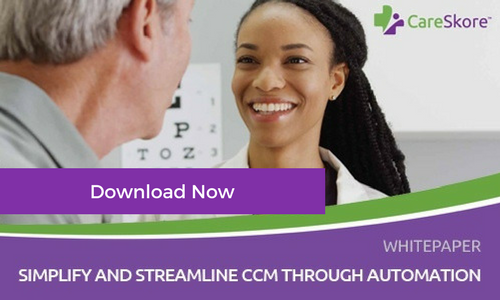Thanks to the rulings made by CMS in 2017, chronic care management (CCM) has begun to rise through the ranks of provider priorities. If you aren’t already familiar with CCM—and the new changes to the program—it’s time to change that. For those that are familiar or have considered implementing CCM in your organization, you may be wondering what technical needs are required for CCM success.
To keep up with the projected increasing demands for CCM services in tandem with the growing shortage of care providers—coupled with the degree of documentation and communication required by CCM—broad-based automation must be part of your CCM equation.
There are extensive areas that can leverage automation and artificial intelligence to enable each care professional—especially case managers—to service larger groups of patients without reducing quality. Incorporating automation into these areas reduces overall resource requirements for CCM and expands patient coverage—the number of patients your organization can care for:
- Administrative: automated patient enrollment and tracking and updates of billing codes.
- Workflows: downtime-free integration with your existing systems.
- Care teams:: evaluate needs and where to best allocate personnel.
- Outcomes analysis: understand CCM’s impact on your organization.
Furthermore, we’ve listed 5 ways automation truly transforms CCM. These should be table stakes when considering an artificial intelligence-based solution to help with your CCM initiatives:
Supporting Care Continuum Decisions
Deeply understanding real-time patient risk factors—while monitoring patient responses—during engagements is critical to determine next steps in the care continuum. Should you send a reminder or propose more frequent check-ins to your patient? Should you alert the patient or their care provider(s)? By incorporating an understanding of each patient’s risk into the engagement process, a CCM-focused solution can lessen provider workloads per patient and enable individual care professionals to expand the number of patients they can support without degrading outcomes.
Billing Code Application and Tracking
A CCM program must include applying proper billing codes and keeping them up-to-date in order to make participation seamless and non-disruptive. Automated CCM platforms should have the ability to display appropriate codes while tracking time spent on billable activities and billings against these codes.
Custom Patient Risk Assessments
Machine learning analytics should incorporate claims, clinical, and social determinants to generate accurate, per-patient custom risk assessments. By leveraging AI, you can identify patients eligible for CCM while automatically differentiating between non-complex and complex CCM. This can reduce onboarding and patient uncertainty for providers to reduce deployment hurdles.
Care Coordination Alignment
Ensuring that all care coordination—both within your organization and across different, external provider participants—are aligned is critical. A CCM-focused solution should be able to standardize evidence-based, custom care plans to allow for rapid identification of care gaps.
Resource Requirement Reductions
Leveraging AI enables remote care and reduces care team resource requirements per patient while automating many assessments and communicating directly between provider and patient. CCM’s efficiency can be boosted further with telehealth; text, video chat, and IVR or integrations of wearables and monitoring devices.
To learn more about everything you need to know on chronic care management, download our whitepaper, "Simplify and Streamline CCM Through Automation."
